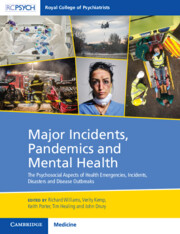 Major Incidents, Pandemics and Mental Health
Major Incidents, Pandemics and Mental Health from Section 4 - Responses to Meet the Mental Health Needs of People Affected by Emergencies, Major Incidents, and Pandemics
Published online by Cambridge University Press: 11 January 2024
Although many people will experience a mental health reaction to major incidents and pandemics, only a minority of people affected are likely to require mental healthcare. Most people will not develop a mental disorder, but common conditions will be precipitated, such as adjustment disorders, anxiety disorders, depressive disorders, post-traumatic stress disorder (PTSD), and substance use disorders. Other conditions include complex PTSD, prolonged grief disorder, psychosis, somatic symptom disorders, and neuropsychiatric consequences of infection in pandemics. The evidence for the prevention of mental disorders through formal interventions is very limited, and contrasts with strong evidence for effective treatments. In order to provide optimal care following major incidents and pandemics a biopsychosocial framework is appropriate, with mental health service provision being part of a whole system approach. A seamless, person-centred mental healthcare pathway for those affected would probably involve first responders, primary care, secondary physical care, the third sector, and social care.
To save this book to your Kindle, first ensure [email protected] is added to your Approved Personal Document E-mail List under your Personal Document Settings on the Manage Your Content and Devices page of your Amazon account. Then enter the ‘name’ part of your Kindle email address below. Find out more about saving to your Kindle.
Note you can select to save to either the @free.kindle.com or @kindle.com variations. ‘@free.kindle.com’ emails are free but can only be saved to your device when it is connected to wi-fi. ‘@kindle.com’ emails can be delivered even when you are not connected to wi-fi, but note that service fees apply.
Find out more about the Kindle Personal Document Service.
To save content items to your account, please confirm that you agree to abide by our usage policies. If this is the first time you use this feature, you will be asked to authorise Cambridge Core to connect with your account. Find out more about saving content to Dropbox.
To save content items to your account, please confirm that you agree to abide by our usage policies. If this is the first time you use this feature, you will be asked to authorise Cambridge Core to connect with your account. Find out more about saving content to Google Drive.